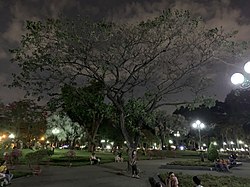| Gò Vấp district Quận Gò Vấp | |
|---|---|
| Urban district | |
 Gia Dinh park in Go Vap district Gia Dinh park in Go Vap district | |
 Seal Seal | |
 Position in HCMC's core Position in HCMC's core | |
 | |
| Coordinates: 10°50′30″N 106°40′00″E / 10.84167°N 106.66667°E / 10.84167; 106.66667 | |
| Country | |
| Centrally governed city | Ho Chi Minh City |
| Seat | 332 Quang Trung, Ward 10 |
| Wards | 16 wards |
| Area | |
| • Total | 20 km (8 sq mi) |
| Population | |
| • Total | 763,313 |
| • Density | 38,000/km (99,000/sq mi) |
| Demographics | |
| • Main ethnic groups | predominantly Kinh |
| Time zone | UTC+07 (ICT) |
| Website | govap.hochiminhcity.gov.vn |
Gò Vấp is a district of Ho Chi Minh City. Since the 80s, it has undergone significant urbanization. It is more populous than most of the other districts.
A high urbanization rate has made Gò Vấp become one of the three districts that has high population growth in the city. Specifically, Gò Vấp had 144,000 people in 1976, and the population increased to 223,000 people in 1995, 231,000 people in 2000, 413,000 people in 2003, and 455,000 people in 2004. From 1980 to 2003, the population of Gò Vấp increased to nearly 3 times its population, and on average, increased 13.66% annually. According to the population census in 2017, the population of Gò Vấp was 663,313 people, the second-most population among other districts in Vietnam.
Geography and administration

Gò Vấp is an urban district located in the north and northwest of Ho Chi Minh City, Vietnam. Gò Vấp borders District 12 in the north and west, Phú Nhuận District in the south, Tân Bình District in the west, and Bình Thạnh District in the east. The total land area is 20 km (7.7 sq mi).
In July 1976, two wards (Bình Hòa and Thạnh Mỹ Tây) splitted from Gò Vấp District to create the new Bình Thạnh district. Later, the ward of Bình Mỹ joined Củ Chi district, and Nhị Bình, Thạnh Lộc, An Phú Đông and Tân Thới Hiệp joined Hóc Môn district. Gò Vấp District now consists of 16 wards—1, 3, 4, 5, 6, 7, 8, 9, 10, 11, 12, 13, 14, 15, 16 and 17—and is mostly residential.
Historically, Gò Vấp was part of Gia Định province until 1976, when the province was annexed to the city of Saigon and renamed into Ho Chi Minh City.
Population
According to the population census in 2017 of Ho Chi Minh City's Census Bureau, the district's population was 663,313 people, and the population density was 33,602 people per square kilometer. There are 8 ethnic groups in Gò Vấp, which are the Kinh people (98%), the Hoa people (1.8%), and the other 6 minor ethnic groups (0.2%).
References
- ^ "HCMC's Population and Labor in 2017". HCMC Office of Statistics. Retrieved Apr 16, 2019.
| Ho Chi Minh City (Saigon) | ||
|---|---|---|
| Municipal city |  | |
| Urban districts | ||
| Rural districts | ||
| Others | ||
| Districts of Southeast Vietnam | ||
|---|---|---|
| Ho Chi Minh City |
|  |
| Bà Rịa–Vũng Tàu province | ||
| Bình Dương province |
| |
| Bình Phước province |
| |
| Đồng Nai province | ||
| Tây Ninh province |
| |
| denotes provincial seat | ||
This article about a location in Ho Chi Minh City, Vietnam is a stub. You can help Misplaced Pages by expanding it. |